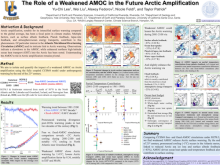The role of a weakened AMOC in the future Arctic amplification
Yu-Chi
Lee
Department of Earth and Planetary Sciences, University of California Riverside, Riverside, CA, USA
Poster
Arctic amplification (AA) is well-documented, featuring enhanced Arctic warming under global warming. AA is driven by a number of factors, including sea ice loss and radiative feedback. Here, we compare two climate model simulations with a weakening and steady AMOC under the RCP8.5 scenario to investigate the influence of the Atlantic Meridional Overturning Circulation (AMOC) on AA. We find that a weakened AMOC results in a 2°C Arctic cooling and up to 5°C cooling in the Atlantic sector by the end of the twenty-first century, relative to the global warming simulation with an unchanged AMOC. We further find that surface albedo feedback, linked to reduced sea ice loss due to AMOC slowdown, is the primary contributor to such Arctic cooling. Although shortwave cloud feedback slightly warms the Arctic, it plays a significant role in the strong cooling over the North Atlantic warming hole region due to increased low-level cloud fraction. In summary, our findings suggest that a weakened AMOC could reduce the AA by around 15% by the end of the century.

lee-yuchi-polar-poster.pdf
(6.22 MB)
